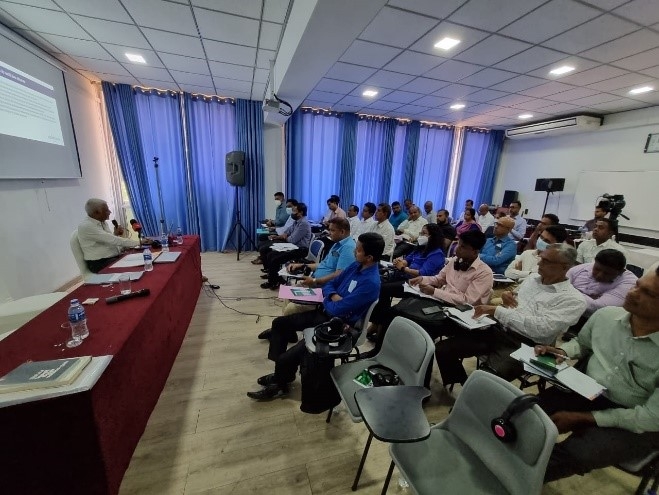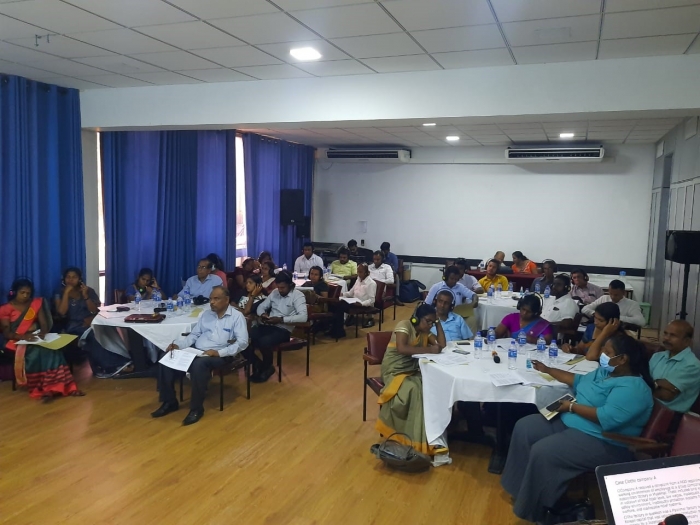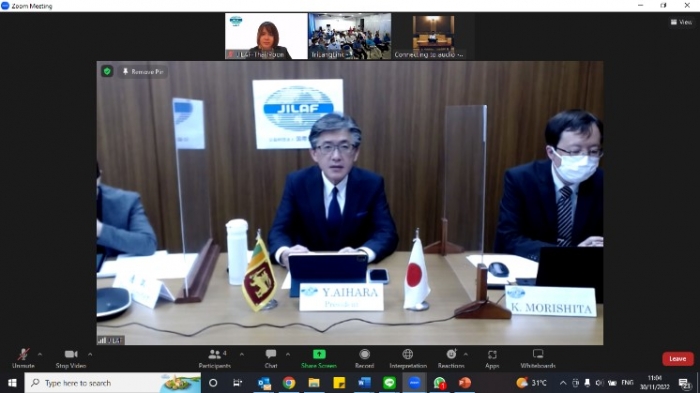SLNSS & NTUF/JILAF Seminars on Industrial Relations (IR) and Labour Policy in Sri Lanka
The Japan International Labour Foundation (JILAF), held seminars on industrial relations and labour policy in Colombo, Sri Lanka, with the Sri Lanka Nidahas Sewaka Sangamaya (SLNSS) on November 30, and with the National Trade Union Federation (NTUF) from December 1-2 (JILAF participated online). A total of sixty people participated in the seminars.
At the beginning of the seminar with the SLNSS, Leslie Devendra, the Secretary General of the SLNSS, gave opening remarks and explained that in Sri Lanka, the economic crisis has made many companies unstable, resulting in concerns about employment and workers’ livelihoods. He then expressed the need to learn from Japanese trade unions, which have experience overcoming various crises, and shared that in order to fulfil that need, the seminar was being held under the topic of “Industrial Relations in Crisis Situations.”
Next, JILAF gave a lecture on the topic of “Industrial Relations in Crisis Situations in Japan,” in which they spoke about matters such as (1) trade unions and industrial relations in the period immediately after World War II, (2) the productivity movement and the three principles of productivity, (3) the spring labour offensive and the labour-management consultation system, and (4) initiatives to stabilise employment during the COVID-19 pandemic.
Following this, SLNSS gave a presentation where they shared that since the effects of the COVID-19 pandemic and the recent economic crisis have devastated various industries, the Sri Lankan government has begun to consider privatising state-run enterprises in order to maintain business and employment. Afterwards, two academics each explained the advantages and disadvantages of privatisation, and concluded that it is necessary for trade unions to fulfil their role by prioritising dialogue, such as labour-management consultations, while considering the rights and interests of union members.
At the end, Secretary General Devendra concluded the seminar by expressing that while there are concerns about the stability of employment in Sri Lanka, which is in the midst of an economic crisis, they would like to learn from Japan’s case at the seminar and strengthen cooperation between the government, labour and management to overcome this crisis. Then, he stated that in order to do this, it is necessary to build a relationship of trust between labour and management, where both parties are sincere and respectful to one another.
During the seminar with NTUF, JILAF President Yasunobu Aihara started off by introducing JILAF and sharing the topic of the seminar. Next, NTUF President Vadivel Suresh and Senior Assistant Director General of the EFC Prasad de Silva explained that Sri Lanka is considering ratifying ILO Convention No. 190 to end exploitation and sexual violence against workers, and that trade unions will play the role of pursuing this ratification on the basis of constructive industrial relations, while being mindful of business and human rights. They then thanked JILAF by stating that the seminar would be very beneficial for the fulfillment of this role.
Continuing on, JILAF Counselor Koji Kogure gave a lecture on “Business and Human Rights” and “The Spring Labour Offensive in Japan.” In response, a participant voiced their opinion stating, “The concept of business and human rights is not yet widely recognised in Sri Lanka, and needs to be strengthened by working together with the international trade union network.” In addition, participants asked questions about matters such as the procedure for collective bargaining and the pension system in Japan, to which appropriate answers were given.
Afterwards, NTUF Secretary General Padmasiri Ranawakaarachchi explained the labour dispute coordination system and the role of each relevant agency in his lecture on “Industrial Relations in Sri Lanka.”
Furthermore, specialists also provided basic information in their lectures on the “Social Security System and Workers’ Livelihoods” and “Occupational Health and Safety.”
At the end of the seminar, a participant commented, “While sharing the issues of our respective workplaces, we reaffirmed that trade unions play the role of properly gathering the opinions of workers, and engaging in dialogue with employers and the government.” Lastly, NTUF Secretary General Padmasiri Ranawakaarachchi closed the seminar by stating that Japan’s case is a good example of having resilience against crises, and that he would like to strengthen each organisation by making use of what was learnt in the seminar.



